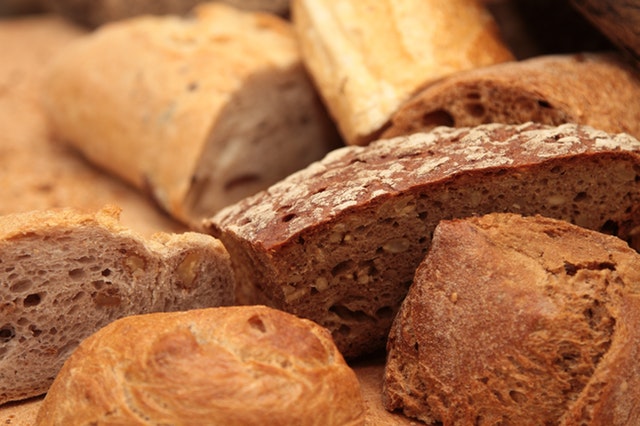Carbohydrates have a reputation for being unhealthy. However, it is only the type of carbohydrate that is unhealthy. Carbohydrates are actually the body’s preferred fuel. Unrefined carbohydrates like sprouted legumes, whole, sprouted grains, and vegetables are dense in nutrients and fiber, and they can give your body the fuel it needs. Refined carbohydrates like white, refined flour, pasta, and bakery goods have no or little fiber and are nutrient-empty.
There is a difference in the way refined carbohydrates and unrefined carbohydrates are converted into glucose by the body. Refined carbohydrates are converted to glucose quickly, which causes blood sugar to spike. This makes the body work hard to get the blood sugar level under control. It puts pressure on the pancreas to make and release insulin, which works “like a key to open the door of the cells so glucose… can come inside and be converted into energy.”
If too many refined carbohydrates are eaten on a continual basis, driving up blood sugar levels, this will stress the pancreas and eventually it will have trouble making insulin. This can result in diabetes.
The body will also turn the excess glucose into fat. This can result in weight gain and obesity. Carrying too much fat can lead to glucose intolerance. The body will start ignoring the signal to take glucose from the blood.
Many nutrient-empty, refined foods have fructose in them. Fructose doesn’t appropriately stimulate insulin production, which means the body fails to suppress its “hunger hormone” leptin. This hormone suppression is what makes us feel satisfied, so fructose is actually making us feel hungrier instead of satisfied.
Then, to process these nutrient-empty, refined foods, the body must pull nutrients from itself. The spiking of blood sugar from refined and empty food results in cravings, because when the body is not getting the nutrients it needs, it will start begging for them. On the other hand, feeding the body with nutrient-dense food gives it what it needs, and there shouldn’t be any cravings.
Because unrefined carbohydrates are fiber-rich, they take longer to digest. This means they do not put additional pressure on the pancreas to produce insulin in an unhealthy way. Unrefined carbohydrates, such as whole grains, should be a major part of a well-balanced diet.
Packaging can be very deceiving and misleading. When looking at a package that says “whole wheat” or “whole grain,” read the ingredient list and make sure it says “whole” before every grain listed. If the ingredient list contains just the name of the grain, then it is not whole-grain.
You also want to make sure any of these products or foods are sprouted, so the phytic acid and enzyme inhibitors are removed. Many carbohydrates, as well as proteins, (nuts, seeds, grains, beans, and lentils) are very healthy for you and are full of nutrients. But many people don’t know they contain phytic acid. Phytic acid can prevent the body from absorbing important minerals such as calcium, magnesium, iron, and zinc, as well as cause acid indigestion.
Phytic acid has powerful anti-nutritional effects because it binds to minerals in your food to form phytates, which makes those minerals unavailable to your digestive system. It also inhibits enzymes in the body that are vitally important for digesting food properly. The high level of phytic acid in nuts, seeds, grains, beans, and lentils is a serious problem in the modern diet, resulting in many health problems including tooth decay, nutrient deficiencies, lack of appetite, and digestive problems.
The phytic acid in nuts, seeds, grains, beans, and lentils can be removed by soaking and sprouting them. Historically, indigenous cultures always did this before consuming them or feeding them to their animals. This is not done in modern day society, to the detriment of human and animal health. This is why my cookbooks Include the steps of preperation, which includes making these foods free of the phytic acid and enzyme inhibitors.
If you are buying gluten-free products, make sure they are sprouted and whole-grain, or sprouted beans, sprouted lentils, sprouted rice, sprouted, and check the sugar content. I have found that even in the seemingly healthiest packages at the “healthy grocery stores,” the gluten-free foods are alarmingly high in sugar. It is extremely important to find ones that are low in added sugar.
So, in conclusion, as we get into the holiday season and we are out dining/ partying at places where there may be a lot of carbohydrate choices, try picking the healthiest ones and avoiding the ones that can damage your health and well-being.
copyright@nancyaddison2014
Please, leave a comment and join in the conversation!
I’d love to hear from you!






This makes so much sense! I love how you explain the way certain foods give your body nourishment and fuel, and other foods that you might think are healthy, actually have NO nutrients, and make your body work harder just to keep your body in balance. I am going to watch my carbs much more closely now, and make sure I only eat those that are unrefined and low in sugar, as well as check that the ingredients are always whole grains. I learn something new every time I read your blog. Thank you for sharing these amazing health tips.
Hello to all
In this puzzling continuously, I love you all
Rise your family and friends